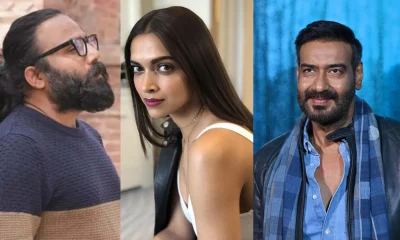Sports
Unleashing Potential: The Rapid Rise of Indian Chess Led by Gukesh, Divya, and Emerging Stars
Unleashing Potential: The Rapid Rise of Indian Chess Led by Gukesh, Divya, and Emerging Stars
There have been many reasons to celebrate Indian sports in 2024—a year when the country has excelled at several disciplines and brought people together in pride. Men’s cricket broke their global title drought dating back 11 years, while shooter Manu Bhaker won two bronze medals at the Olympics, which were held just before COVID-19 delayed them in 2020.
Hockey players made India proud too by securing a second successive bronze medal; there was success of a different kind towards the end of the COVID Paralympics with a haul that included 29 gongs, meaning it finished the competition as never before. All this underlined not only an increasing sporting achievement worldwide but also how hard its stars work—often against odds—to gain international success.
A Landmark Day for Indian Chess
Nonetheless, one of the most remarkable days in Indian sports history took place recently at the 45th Chess Olympiad in Budapest, Hungary. India won two gold medals—a first in the event’s century-old existence. The triumph, which came after 44 previous editions without an Indian team finishing top, underscored how much progress has been made: from relying on individuals to having strength across all boards.
Ten years ago, India made history by winning its first medal in the Chess Olympiad. The team took bronze in the open category at the 2014 event in Tromso, Norway. Indian chess has been on the up ever since, as shown by two further bronze medals won at Olympiads held in Chennai. These past successes helped pave the way for an outstanding performance in Budapest. For a long time, the Soviet Union and then Russia dominated this competition, but other countries have also become forces to be reckoned with—more notably Ukraine, Armenia, and China. Nonetheless, at the most recent Olympiad, it was India that stole the show to demonstrate not only that they belong among these new chess powers but perhaps too!
Emerging Superstars

This win wasn’t just because of one brilliant person. It happened because a whole team worked together brilliantly—and this team has been getting better for ages! Players such as R Praggnanandhaa, Vidit Gujrathi, and Pentala Harikrishna made the tournament exciting; you could feel the talent in the air when they were around. Nevertheless, although those stars shone brightly, they didn’t outshine everybody else completely, which is why India won! Thanks especially to fantastic performances from D Gukesh and Arjun Erigaisi, the final result was never really in doubt—and that made their teammates (plus coaches and fans) very happy indeed.
Having had an outstanding year, Gukesh made history in Toronto by winning the Candidates Tournament and becoming its youngest-ever champion. His next challenge will be China’s Ding Liren, as he seeks to become World Chess Champion—a prospect that only adds to the buzz about him. Meanwhile, back in Budapest, things couldn’t have gone better for the teenager who showcased extraordinary talent: after finishing the Olympiad on 9/10 overall (including eight wins), he took home individual gold for the second time running!
During India’s Round 10 match against the USA, Gukesh stole the show by beating Fabiano Caruana, a player who has been ranked world No. 3 in the past. The whole team started to believe they could win the tournament outright. As well as underscoring just how strong a player he is, Gukesh’s performance showed the importance of working together—something that marked out this Indian squad from other teams. “To be honest, I wasn’t thinking too much about my own games today; I just wanted us to do well as a team,” said Gukesh afterward.
The Stellar Rise of Arjun Erigaisi
Arjun Erigaisi made waves in the competition too; he scooped gold for his performance on Board 3, winning nine out of 11 games. These successes at the event in Budapest have shone a new light on the player: he now sits above Caruana in the global rankings (at number three), having leapfrogged the Italian-American. Indeed, with D. Gukesh also from India occupying fifth place, two of the top five are from the Asian nation—indicative not only of its bright future but also of present strength in depth. Beating Slovenia’s J. Subelj in the final rubber was always going to be crucial if they were going to finish top… but one might argue victory over Cuba-born Spaniard L. Domínguez earlier on was just as important: after all, it helped see off an Uzbekistan side and showed resilience too by Erigaisi et al. after being held by the same opponents in the previous round.
Women’s Chess Team Shines
Not only did the men’s Indian chess teams do well, but so did the women’s teams. Divya Deshmukh and Vantika Agrawal both won gold medals for their boards—an impressive feat! One of them, Deshmukh, showed how good she is by beating Poland in round eight (the team’s only win that round). These two players with Performance Ratings (PR) over 2500—Deshmukh’s PR being 2608 while Agrawal had 2558—helped India finish first overall, meaning they must have done something right! It wasn’t just these top performers though; R. Vaishali, Harika Dronavalli, and Tania Sachdev also made important contributions, showing there are lots of clever girls who can play chess coming from this country.
The Legacy of Viswanathan Anand
Even though chess has seen remarkable progress, Viswanathan Anand’s impact on the game should not be forgotten. He has motivated a whole group of new players and even today continues to have a major influence on chess in India—as a mentor. People have said that Anand is to chess what some greats of other sports are to their own games: for example, Prakash Padukone and Pullela Gopichand in Indian badminton. There are lots of people who could challenge for the world title from India, which shows how things have moved on with those four plus Gukesh, Arjun, Praggnanandhaa, and Divya, all aged 14 or younger.
Also Read: Rishabh Pant Hilariously Guides Bangladesh Captain on Field Placement, Leaves Commentators in Splits | WATCH
Looking Ahead: The Future of Indian Chess
Indian chess has had an outstanding year in 2024. This becomes clear when we consider some recent events. Gukesh did very well in the Candidates Tournament; at just 17 years old, he emerged victorious. Meanwhile, 18-year-old Arjun is now world No. 3—behind only Magnus Carlsen and Alireza Firouzja. And then there is Praggnanandhaa, who achieved something almost unbelievable recently: he beat Carlsen. With Liren coming up next as challenger for these three youngsters’ World Championship crown, there is much talk about whether an Indian can defend such a coveted title. Gukesh, for one, has already made quite some waves in Budapest so far! Indeed, the wider chess community senses that this South Asian country may be on the brink of a golden era if not already experiencing one—lots more excitement than usual among fans too, of course!
To sum up, the successes of Indian sportsmen at the Chess Olympiad and in other sports show how much they have improved. They have both played well on their own and worked together brilliantly, so there is every chance that they will do more great things worldwide. People in India are excitedly waiting to see what happens next. If this report is anything to go by, then chess as well as other kinds of sports look set for a bright future indeed! There is loads of talent coming up from below, aged under 20, ready—not just yet another world beater but perhaps lots of them—meaning with such strength and depth across sporting disciplines, the country could soon be dominating the globe like never before.












